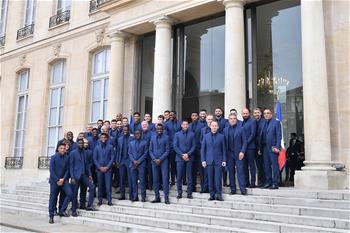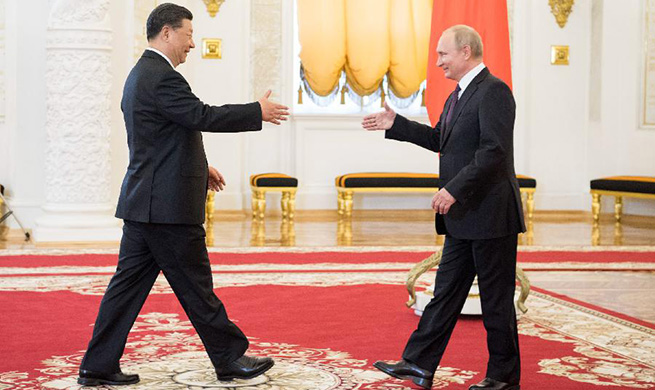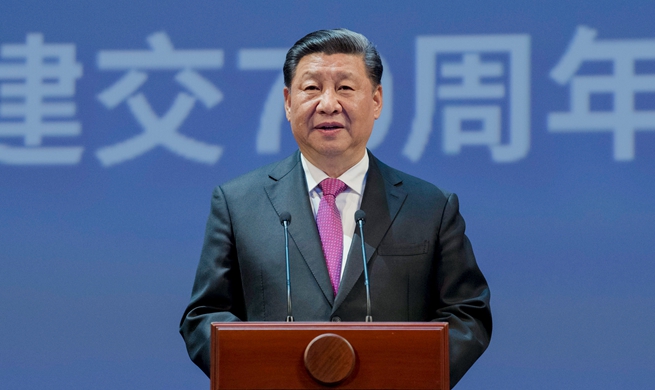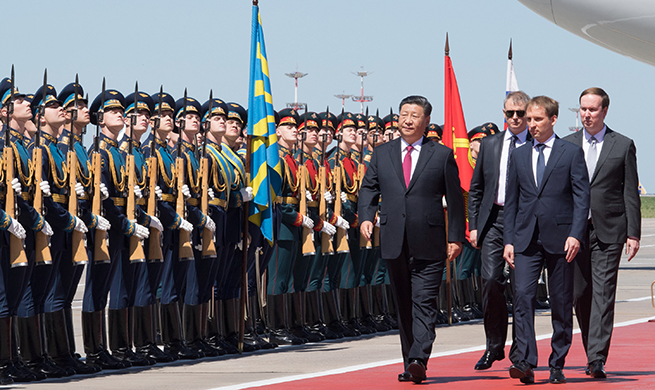DOHA, June 6 (Xinhua) -- Despite the latest signs of detente in the two-year-long diplomatic crisis between the Saudi Arabia-led Arab bloc and Qatar, analysts say uncertainty remains considering the U.S.-Iran and Saudi-Iran rivalries that always hold sway over the regional developments.
DETENTE IN CRISIS
On June 5, 2017, Saudi Arabia, the United Arab Emirates (UAE), Bahrain and Egypt severed all diplomatic ties with Qatar and imposed a full blockade on the gas-rich Gulf nation, accusing Doha of supporting terrorism and undermining regional security as well as forging close bond with Iran.
Yet since late last year, a succession of overtures have been extended by Riyadh for the prospect of a reconciliation, which started with a letter from Saudi King Salman bin Abdulaziz Al Saud in early December to invite Qatari Emir Sheikh Tamim bin Hamad Al Thani for the summit of the Gulf Cooperation Council (GCC) scheduled for later in the month.
Both Saudi king and Qatari emir attended the Arab League summit held in later March in Tunis, for the first time since the eruption of the crisis. But the hope for a groundbreaking meeting was quickly shattered when the emir surprisingly left the summit shortly after the opening.
In May this year, Sheikh Tamim was once again invited by Riyadh to attend the emergency summits of GCC and the Arab League held in Islam's holiest city Mecca. The Qatari emir, though absent from the three summits, dispatched the minister of state for foreign affairs and the prime minister on his behalf, respectively.
On May 6, Sheikh Tamim held the first phone talks with Bahraini Prime Minister Khalifa bin Salman Al Khalifa since the crisis, while the UAE announced the release of a Qatari military vessel which was seized after entering UAE waters on April 30.
Nabil Murir, a senior Qatari political commentator, said a quick fix to the crisis benefits both sides as it would wreak havoc on their politics and economy and even the entire Arab world if the crisis lingers on.
However, a lot more work is still needed to iron out the crisis, said Louay Qaddoumi, managing editor of the English-language newspaper Qatar Tribune. "The solution must be built on mutual trust which is now lacking for both sides."
SIGNIFICANT MOVERS BEHIND CRISIS
Allied with the GCC countries, the United States always holds great influence on Arab nations, while Iran, Saudi Arabia's Shiite arch rival in the Middle East, remains a touchy issue that tests the patience of all interested parties for a rapprochement.
For the part of Washington, it pursues the principle of "America First" in dealing with international affairs, said Thakkamacharey Noushad, a senior journalist of the daily Al Sharq, a leading newspaper in Qatar.
"Despite the great damage incurred by the crisis to the parties concerned, it remains to be seen whether the U.S. will help find a solution as it has to weigh the benefits against the costs first," he explained.
Iran has also played a vital role in where the crisis may lead. Immediately after the crisis broke out, Iran came to Qatar's assistance by delivering life necessities and providing airspace for its commercial flights. Under the circumstances, Qatar will definitely not side with Saudi Arabia's hard-line stance against Iran.
On June 2, Qatari Foreign Minister Mohammed bin Abdulrahman Al Thani criticized the final statements of the GCC and Arab summits for merely following the anti-Iran policy advocated by the U.S. without envisaging a "dialogue" with the Islamic republic.
"The Mecca summits ignored the important issues in the region ... we wish to lay the foundations of a dialogue to reduce the tensions with Iran," the top Qatari diplomat said.
WHAT LIES AHEAD FOR CRISIS?
Currently, the rising tensions between Washington and Tehran have become a strong factor in shaping the developments of the crisis.
The several tours of U.S. Secretary of State Mike Pompeo to the Gulf this year all aimed to establish a Middle East strategic alliance against Iran.
It is inconceivable that the U.S. will allow Qatar to stand alone on this issue.
Meanwhile, as Washington needs the support of Gulf Arab nations in its confrontation with Tehran, it probably acquiesces in more Saudi pressures on Doha if closer ties between Iran and Qatar are detected, thus dragging the crisis further into the abyss of unsolvability.

















